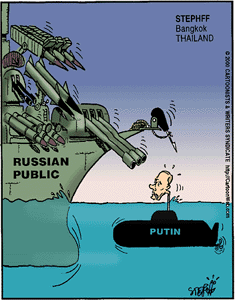
Philip Terzian
Americans of a certain age will recall the loss of the USS Thresher, an atomic sub that sank in
the North Atlantic in April 1963, killing 129 crewmen. The plight of the Russian nuclear vessel
Kursk, which exploded in the Barents Sea last week, was a grim reminder of the hazards
submariners face. After a few days of weakening contact, it became apparent that all 118 men on
board had probably perished. A Norwegian salvage team finally confirmed the terrible truth.
At the moment, no one is quite certain what caused the Kursk explosion, which ripped a huge
hole in its hull, sending it down to its doom. It may well have been an accident that might
have been avoided, or the result of several years of dangerous neglect. As with the crash of
TWA Flight 800, it may be demonstrated beyond doubt that an explosion caused the disaster, but
impossible to prove what triggered the explosion. In any case, the crew of the Kursk is dead,
and 118 Russian families and their friends are in mourning.
The official Russian reaction to these events must be something of a puzzlement to
Americans. When the Kursk was first reported to be in distress, President Vladimir Putin was on
holiday at a Black Sea resort. He did not cut short his vacation and hurry back to Moscow, much
less stop by the Kursk's home base. Indeed, as several days went by, Putin remained on
vacation.
To be sure, there was a certain cold logic in his thinking, as Putin explained. Any hope
for the Kursk's salvage did not lie with him personally, but with those charged with such
responsibilities. He was as useful to the rescue operation at his vacation lodge as on the deck
of a naval vessel. He also suggesed, in one revealing comment, that he was more concerned about
the Kursk's sophisticated hardware than he was about the humans trapped inside.
Even more puzzling was the behavior of Russian naval authorities. There is now some
international quibbling over who offered and solicited foreign assistance, and when, for the
struggling Russians. But it is fairly clear that, once the plight of the Kursk became known,
NATO members -- notably Britain, Norway and the United States -- offered immediate aid, which
was rejected. It was not until a few days later, when all hope for the crew had been lost, that
the Russians finally asked for help.
(There may well be some validity in that last point: The post-Soviet military is probably
incapable of sustaining a big nuclear fleet.)
While President Putin has since offered a more comprehensive apology, saying that he feels
"guilt and responsibility" for the Kursk disaster, many in the West have been shaking their
heads at this post-Cold War, Soviet-style behavior. Mr. Putin acted like a supreme bureaucrat
rather than a democratic leader. And the old Soviet doctrine of secrecy and suspicion -- not to
say misplaced pride -- has never seemed more self-defeating.
Some have recalled Mikhail Gorbachev's lethal silence about the nuclear accident at
Chernobyl, which was first discerned by Swedish scientists in the West, and imperiled the lives
of millions of Ukrainians and East Europeans. Others, quoting the 19th-century French
chronicler of Russia, the Marquis de Custine, have gone so far as to wonder whether such
national flaws are genetic: Russia, said de Custine, is "the prison house of naions [where]
secrecy presides over everything."
There is a temptation to agree with the Marquis. Russia, geographically isolated and
culturally remote, has always been ambivalent about its connections to the West. But that is
unfair to contemporary Russia. When you look at the effect of Soviet communism on societies
deep in the heart of Europe -- East Germany, Hungary, Czechoslovakia, etc. -- it is difficult
to conclude that Russia's experience is unique. If, say, an East German submarine had been
trapped on the floor of the Baltic Sea, you can be certain that President Erich Honecker would
have kept it quiet as long as possible, rebuffed any offers of help from the West, and offered
little solace to the families of the crew. It was the nature of the communist dictatorship, not
Russian peculiarity, that led to the Kursk tragedy.
Eleven years after the fall of the Berlin Wall, Germany remains burdened with the plight of
its degraded East -- a problem that is bound to persist for some time. East Germany suffered
under Soviet rule for four decades, but Russia was communist for three-quarters of a century.
We shouldn't be surprised if old habits
http://www.jewishworldreview.com --
THERE CAN BE FEW deaths more horrifying than drowning inside a submarine.
At that point, President Putin emerged from the sunshine to offer his condolences: He met
briefly with grieving relatives of the Kursk crew, and then returned to Moscow. The admirals,
in the meantime, were busy absolving themselves of responsibility, challenging Western versions
about how and when help was available, and bitterly griping about cuts in naval expenditures.
JWR contributor Philip Terzian is associate editor of The Providence Journal.
Comment by clicking here.
08/24/00: Social progress on one front, regression on the other
08/21/00: The beat goes awry
08/17/00: The unwelcome democrat
